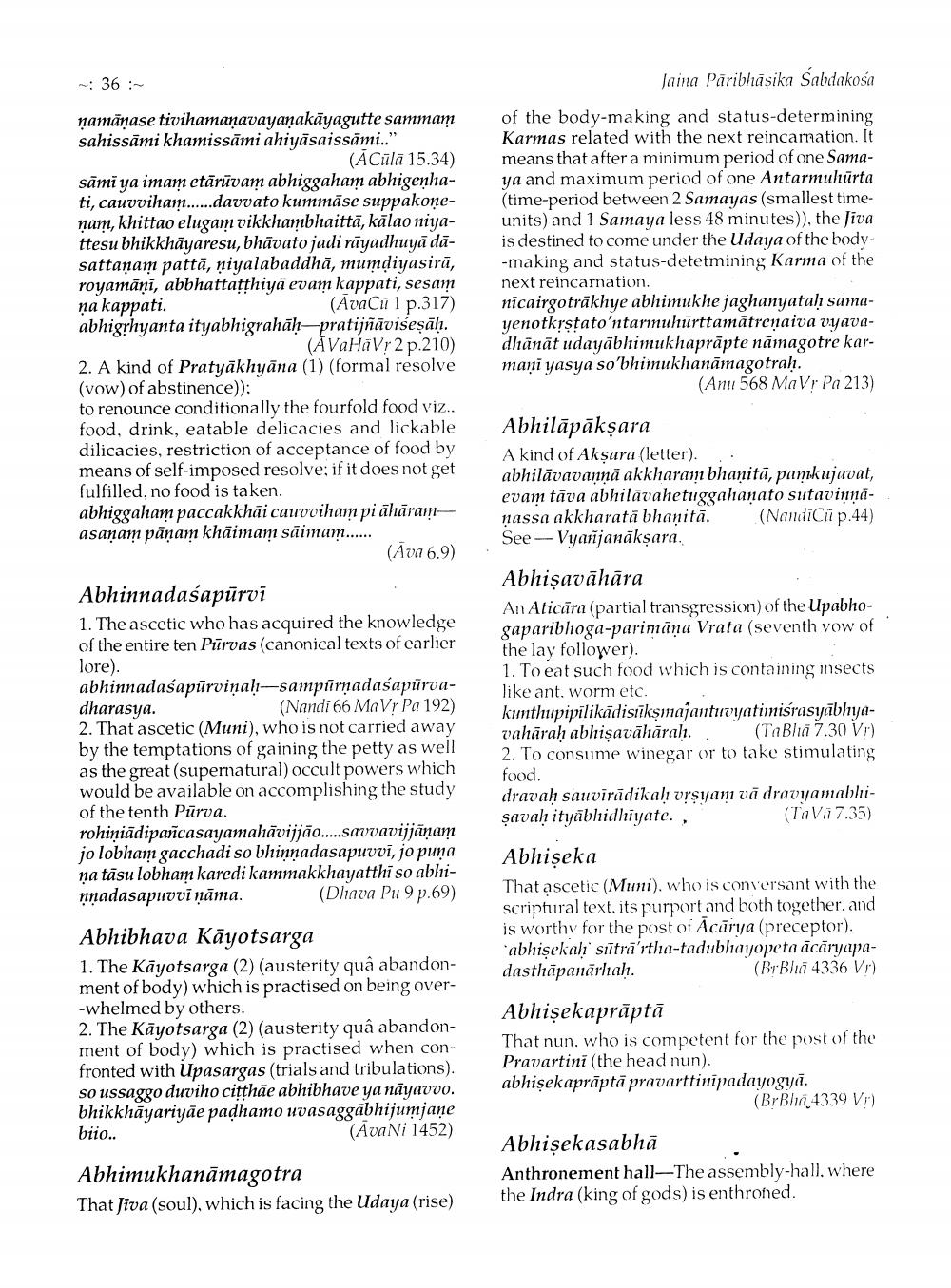________________
-
36 :
Jaina Pāribhāsika Sabdakosa
namänase tivihamanavayanakāyagutte sammam sahissāmi khamissāmi ahiyāsaissāmi.."
(ACūlā 15.34) sāmi ya imam etārūvam abhiggaham abhigenhati, cauvviham......davvato kummāse suppakonenam, khittao elugam vikkhambhaittä, kälao niyattesu bhikkhāyaresu, bhāvato jadi rāyadhuyā dāsattanam pattā, ņiyalabaddhā, mumdiyasirā, royamāni, abbhattatthiyā evam kappati, sesam ņa kappati.
(AvaCu 1 p.317) abhigrhyanta ityabhigrahāh-pratijñāviseşāh.
(ÁVaHÔVr 2 p.210) 2. A kind of Pratyākhyāna (1) (formal resolve (vow) of abstinence)); to renounce conditionally the fourfold food viz.. food, drink, eatable delicacies and lickable dilicacies, restriction of acceptance of food by means of self-imposed resolve: if it does not get fulfilled, no food is taken. abhiggaham paccakkhāi cauvviham pi āhāram asaņam pāņam khāimam sāimam......
(Ava 6.9)
of the body-making and status-determining Karmas related with the next reincarnation. It means that after a minimum period of one Samaya and maximum period of one Antarmuhurta (time-period between 2 Samayas (smallest timeunits) and 1 Samaya less 48 minutes)), the Jiva is destined to come under the Udaya of the body-making and status-determining Karma of the next reincarnation. nicairgotrākhye abhimukhe jaghanyatah samayenotkrstato'ntarmuhurttamātrenaiva vyavadhänāt udayābhimukhaprāpte nāmagotre karmani yasya so'bhimukhanāmagotrah,
(Anu 568 MaV! Pa 213)
Abhilāpākşara A kind of Aksara (letter). . abhilāvavannā akkharambhanitā, pamknjavat, evam tāva abhilāvahetuggahanato sutavinnanassa akkharată bhanitā. (Nandicap.44) See -- Vyarijanākşara.
Abhinnadasapūrvi 1. The ascetic who has acquired the knowledge of the entire ten Pūrvas (canonical texts of earlier lore). abhinnadaśapūrviņah-sampūrnadasapūrvadharasya.
(Nandi 66 Ma Vr Pa 192) 2. That ascetic (Muni), who is not carried away by the temptations of gaining the petty as well as the great (supernatural) occult powers which would be available on accomplishing the study of the tenth Pūrva. rohiņiādipancasayamahāvijjão.....savvavijjānam jo lobham gacchadi so bhinnadasapuvvi, jo puna na tāsu lobham karedi kammakkhayatthi so abhiinnadasapuvviņāma. (Dhava Pu 9 p.69)
Abhisavāhāra An Aticāra (partial transgression) of the Upabhogaparibhoga-parimāņa Vrata (seventh vow of the lay follower). 1. To eat such food which is containing insects like ant, worm etc. kimthupipilikādislīksmajantuvyatimisrasyābhyavahārah abhisavāhārah. (Ta Bhā 7.30 VI) 2. To consume winegar or to take stimulating food. dravah sauvīrādikah vrsyam vā dravyamablişavah ityābliidhiyate.
(ToVa 7.35)
Abhiseka That ascetic (Muni), who is conversant with the scriptural text. its purport and both together, and is worthy for the post of Acura (preceptor). abhişekah svītrā'rtha-tadubhayopeta ācāryapadasthāpanārhiah.
(Br Bhi 4336 VI)
Abhibhava Kāyotsarga 1. The Kāyotsarga (2) (austerity quâ abandonment of body) which is practised on being over-whelmed by others. 2. The Kāyotsarga (2) (austerity quâ abandonment of body) which is practised when confronted with Upasargas (trials and tribulations). so ussaggo duviho citthāe abhibhave ya nāyavvo. bhikkhāyariyāe padhamo uvasaggābhijumjane biio..
(AvaNi 1452)
Abhisekaprāptā That nun, who is competent for the post of the Pravartini (the head nun). abhisekaprāptā pravarttinipadayogya.
(BrBha 4339 Vr)
Abhimukhanāmagotra That Jiva (soul), which is facing the Udaya (rise)
Abhisekasabhā Anthronement hall—The assembly-hall, where the Indra (king of gods) is enthroned.




